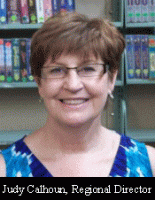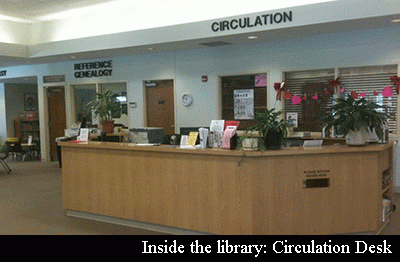Ever feel like your day is packed full of things to do? "Solo librarians" face a list longer than most.
Judy Calhoun started her career as the only librarian at a library in Star City, Ark., an industrial/farming town of 2,300 wedged between the forests of the Arkansas Timberlands and the rich farmland of the Arkansas Delta. Now, as the director of the Southeast Arkansas Public Library, she oversees Star City and eight other branches of the five-county system — several still staffed by solo librarians. Programming Librarian talked to Calhoun about her experience as a solo librarian and the changes she’s seen and made in her library system.
Programming Librarian: As a solo librarian, you must have had to juggle so many tasks. Can you walk me through your typical day?

Judy Calhoun: The biggest thing was always checking books in and out. Then shelving those books, getting computers ready, providing computer help, keeping paper stocked in the copiers and the printers, janitorial service, making bulletin board and book displays. And, of course, any programs you have going on. When you’re the only librarian, you have to do everything. You write the newsletter, you do all the administrative tasks, you order supplies and materials.
You might not have other staff, but you do start developing strategies for managing your time. You learn when there’s downtime and what you can get done. You have to learn to wear a lot of hats and you find little tricks to make it work.
PL: With all that going on, how did you find the time to program?
JC: At the beginning of my career, I was at Star City five days a week from 1 to 6 p.m., and I worked at another library on Saturday mornings. I might have been paid for only five hours a day, but I’d put in 15 to 20 hours (per week) off the clock. There were a lot of times that I would have a storytime in the morning before the library opened.
I also developed some time-savers that helped a lot. I learned to keep a box of prepared storytimes, with books already pulled and coloring sheets or crafts that were cut out and ready so that if anybody came in, I could just do a storytime at a moment’s notice.
Early on, I primarily focused on children’s programming. We always had the summer reading program for six weeks. That was fun; it was my favorite time of year. When I first started in '93, I think I had 20 kids coming for summer reading; when I left in 2007 I think I had over 120. It's still huge. I also started two book clubs: a juvenile book club and a teen book club.

In order to find new programming material, I joined listservs. I was a member of YASLA (the Young Adult Library Services Association) and ALSC (the Association for Library Service to Children), and I would listen to the chatter of children’s and teen librarians and see what programs they were doing and borrow their ideas. Many librarians are happy to share their ideas with one another, you just have to ask.
PL: It sounds like you did a lot of children’s programming. Did you do any adult programming?
JC: I didn’t do a lot of adult programming when I first started. Toward the end of my time at Star City, when we first got computers, we started doing computers basic programs like how to set up an email or resume workshops. I really wish I had thought more about adult programming when I was a solo librarian because these are your voters, and they are the ones who will need to support you if you ever need a tax increase, for example. At the headquarters, where I’m located now, we’ve started senior Bingo. People love it! Now the library means something to them. They feel a sense of belonging. “Oh, yeah, that’s my library. I don’t know what I’d do without Bingo on Tuesdays.” You have to make the library mean something to the people in the community.
As regional director, I am more committed to reaching people that do not normally use the library. The people who read, and use the computers, they already know about us. It’s everybody else that we have to bring into the library. We're working on more ideas for engaging people in the community and giving them a reason to come. The craft movement has exploded in our libraries. It's just been amazing. We’ve done Paint Night, knitting and cake decorating. And it takes so little time to pull together. You ask people who possess these skills to come and lead the sessions. The experts get to share their knowledge, and the participants get to learn. Even a solo librarian has the time to do that.
PL: Those are some great crafts! How did you find help to do all this? Are there any resources that you now recommend to your branch managers?
JC: A solo librarian must turn to volunteers for help to accomplish all their tasks. Retired teachers are a Godsend because they are a great resource for many projects, like bulletin boards and book displays.
There's also Experience Works, a national nonprofit organization that provides training, community service, and employment opportunities for older workers. The organization pays the person they place with us. We usually train them to make copies, send faxes, run the circulation desk and shelve books; this gives the librarian time to host programs. We've also learned to tap into other sources: people working on community service hours, high school kids, or people working off library fines. I‘ve also had some parents who would volunteer to work the desk while I did storytime.
Shelving, one of my biggest tasks, was hard to stay on top of without help! We have library pages or library volunteers that help with it. To make sure they put the books in the right place, we have them play a wonderful online shelving game created by the University of Texas. It’s called “Order in the Library.” Volunteers have to pass all the levels before we let them put away books, because as all librarians know, if a book is put even two shelves over, it’s as good as lost.
PL: That game sounds so cool! Did you have any other concerns as a solo librarian? And how did you address them?
JC: Even patrons of smaller rural libraries need the same services as larger libraries. So you’re called upon provide all these same services and do things that you’ve never really done before. That’s a little scary, and you wonder, am I going to be able to meet the needs of my public? But you learn. You might not be able to answer every question right then, but you learn where the resources are that can help you find the answers.

The budget is always a concern. In Southeast Arkansas, our population has been steadily declining. So, we are seeing a decline in tax-based funds. We also receive state aid – also based on a dwindling rural populace – so we see less of that, too. All of the money for the nine-branch system goes into one regional budget, and it is distributed to the libraries from there. Add to that, our community is seeing higher unemployment. But the more the unemployment, the higher usage we get of these little libraries Small libraries have to figure out how to provide all the same services larger libraries do, with less money.
It’s amazing how a dwindling budget will spark creativity in finding sources to replace needed revenue. Our book budget was so bad I actually won YALSA’s Great Book Giveaway. Sometimes it pays to be poor! We’ve also applied for many other local and national grants. You just try to find money however you can.
Solo and small libraries need to take advantage of their state library agencies; they are an important resource. I would also recommend that small librarians join ARSL (the Association for Rural & Small Libraries). Joining this organization has been the greatest experience of my life. At my first conference, I remember thinking, “Oh my goodness! Everyone here is just like me!” It wasn’t the type of conference where someone was telling you about their wonderful outreach program with a $40,000 budget. Instead, other ARSL librarians shared how to host a great program with 10 bucks.
PL: It sounds like you know some great resources for addressing the problems of small libraries, which I’m sure makes the job more enjoyable. Is there anything else you want to share?
JC: Being a solo librarian is very hard, but community support makes it worth it. The great thing about being in a small library is you get to know your community pretty well. You get to be really friendly with everybody. But, I’ve also noticed that we, as librarians, don’t promote ourselves to the community and those that don’t come into the library. Yet we’re one of the most used places in the community. We see foot traffic any business in our town would kill for, but people don’t think we’re needed. We’re not a business, but we are a resource that this community uses. You need to get the community to help support your library.
People still ask librarians why we are relevant in the age of Internet. But the public still doesn’t know which resources to consult or how to search effectively. Even if you are a small or rural librarian, you know how to find the sources, how to determine if that information is relevant, and how to shift through the rubble of unreliable sources. We’re still your best bet to help you find the information you need.
